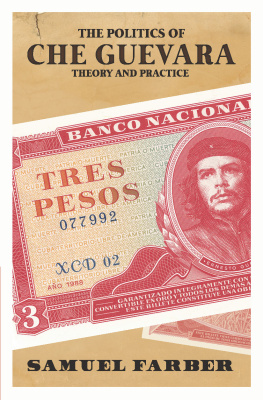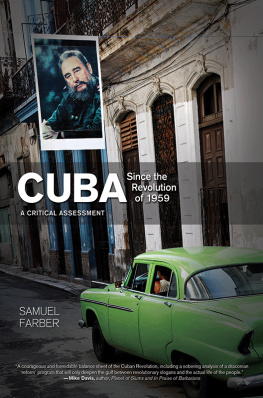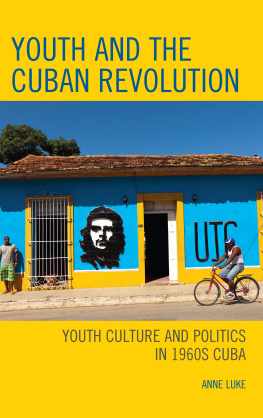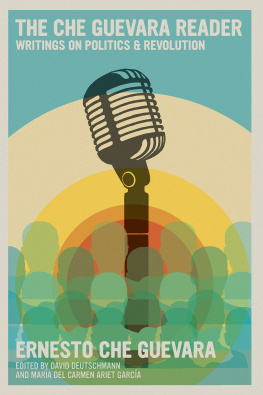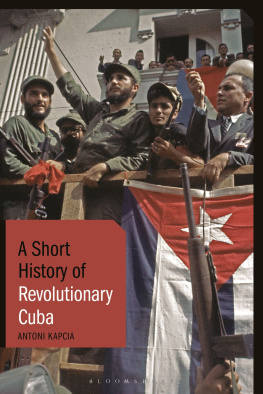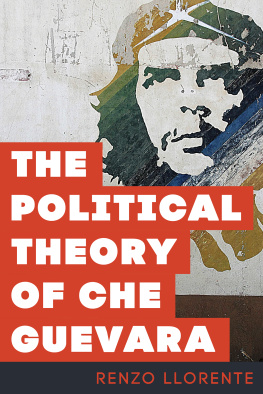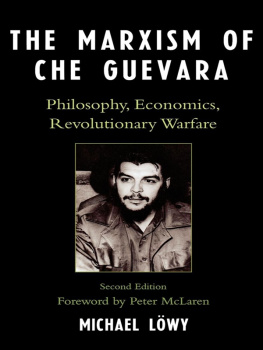Introduction
Che Guevaras Political Relevance Today
E rnesto Che Guevara today has become a commercial T-shirt icon, but more importantly, he is an appealing symbol to legions of young rebels and revolutionaries all over the world. It is ironic that, politically, he has become less relevant in todays Cuba than he is in other countries around the world. Nevertheless, he continues to exercise a subtle but real influence on Cubas political culturenot as a source of specific programmatic political or economic proposals, but as a cultural model of sacrifice and idealism. In that limited sense, the official slogan seremos como el Che (we shall be like Che), chanted regularly by Cuban schoolchildren, probably has a diffuse but significant influence over the popular imagination, even if most Cubans also think of Che as a failed quixotic figure.
Under Ral Castros leadership, the Cuban government has been striving, albeit with setbacks and contradictions, toward a Cuban version of the Sino-Vietnamese model, a form of state capitalism calling for the development of Cuban and especially foreign private enterprise while the state, under the exclusive control of the Communist Party, retains the commanding heights of the economy, a far cry from Guevaras proposed model of state control of the whole economy.
Che is not at all influential among the various wings of the Cuban opposition. Thus, for example, the liberal Cubans collaborating with Catholic reformists in what they hope will become a loyal opposition argue for ideas that run counter to Guevaras legacy, such as creating a government that promotes private enterprise, accompanied by liberal and democratic political reforms, which the Cuban one-party state is not likely to entertain given the risks this would pose to its control.
Che Guevaras politics have their greatest appeal outside of Cuba. It is true that the small political groups that follow Guevaras politics and ideology in toto have rarely attained any significance or influence, but important groups and movements that are not Guevaraist nevertheless claim to be influenced by Che beyond his mere image of the romantic and idealistic revolutionary. This is the case for people like Subcomandante Marcos (now renamed Subcomandante Galeano), the founding leader of the EZLN (Ejrcito Zapatista de Liberacin Nacional) in Chiapas, Mexico, attracted by Ches call to take up arms against oppressive and corrupt governments. Even though Marcos rejected the notion of seizing political power, an idea central to Guevaras political ideology and strategy, he took up arms against an unjust system and cited Guevaras political ideas and practice as an inspiration. In that same spirit of insurgent rebellion, the 1968 Mexican student movement took over the Justo Sierra Auditorium at the UNAM (Universidad Nacional Autnoma de Mxico, the Autonomous National University of Mexico) and renamed it the Che Guevara Auditorium.
In a broader sense, for many rebellious young people throughout the world, Che Guevara is seen as a key leader of the Cuban Revolutionone of the most important revolutions of the twentieth centuryand the only one who coherently practiced what he preached. Even more appealing to many are Ches personal values: political honesty, egalitarianism, radicalism, and willingness to sacrifice for a cause, including his position of power in Cuba. To many of the contemporary rebels active in anticapitalist movements, Che is not only a radical, uncompromising opponent of capitalism, butgiven his opposition to the traditional pro-Moscow Communist partiesalso a revolutionary who shares their own ideals in pursuit of revolutionary and antibureaucratic politics. This is what makes Ches ideas and practices important, and this study relevant, in todays world.
This book analyzes the substantive political ideas and practices of Che Guevara from a standpoint that shares this anticapitalist, antibureaucratic sentiment. It does so, however, based on the belief that socialism and democracy are indispensable requisites to realize those aspirations. I was born and raised in Cuba and participated in the anti-Batista high school student movement of the 1950s, and have been involved in socialist politics for well over fifty years. My political roots are in the classical Marxist tradition that preceded Stalinism in the Soviet Union. Soviet Stalinism established the structural paradigm of a one-party state ruling over the whole economy, polity, and societya paradigm that was later implemented in its multiple national variations by countries such as China, Vietnam, and Cuba. Central to my perspective is a view of socialist democracy in which institutions based on majority rule control the principal sources of economic, social, and political power at the local and national levels. To be a fully participatory democracy, socialism must be based on the self-mobilization and organization of the people, and the rule of the majority has to be complemented by minority rights and civil liberties.
I have written three books and numerous articles on Cuba based on this perspective. Che Guevara is a central part of the story of the Cuban Revolution, but his life and politics have international and theoretical repercussions that go beyond the Cuban story itself. In that sense, this study is closely related to another of my books, Before Stalinism: The Rise and Fall of Soviet Democracy , published in 1990. In that book about the decline of the Russian Revolution, I discussed the degeneration of the democratic soviets that came to power with the triumph of the 1917 October Revolution. While clearly distinguishing Leninism in power from Stalinism, I nevertheless argued that, under the great pressures of the civil war and severe economic crisis, mainstream Bolshevism changed its political character, converting the necessity of repression under civil war conditions into a virtue, thus weakening the resistance to the subsequent emergence of Stalinism. That book focused on the issue of democracy and revolution, as does this study of Che Guevaras political thought and practice. Although of course the political background and historical conditions under which Guevara fought for his ideas were very different from those of the Russian Revolution, they also require us to consider the relationship between revolution and democracy. As will become evident in the rest of this study, while Guevara was an honest and dedicated revolutionary, he did not share Lenins background in classical Marxism, which assumed the democratic heritage of the radical wing of the Enlightenment, but instead grew up with the political legacy of a Stalinized Marxism. Thus, his revolutionary perspectives were irremediably undemocratic, based on a conception of socialism from above rather than below, which raises serious questions about the social and political order he would have brought about had he been successful in his efforts to spark victorious revolutions in the Congo and Bolivia.
Ches Communism
Che Guevara became a Communist in his mid-twenties. To Che, the state was the fulcrum of change and its takeover was the goal of the socialist revolution. But he was an idiosyncratic Communist: he did not join the Communist Party and eventually became highly critical of various features of the Soviet social and political system. He was an extreme voluntarist, holding views more closely resembling Maos Chinese Communist politics than those of the Soviet Union. But even when he became more critical of the Soviet system after leaving the Cuban government, he upheld until the end of his life the monolithic Soviet view of socialism as a one-party state. Che was neither a libertarian nor a democrat in his theory or practice. His socialism/communism precluded any conception of autonomous workers and popular power, or of the political conditions necessary for the existence and survival of the institutions of popular and workers control such as freedom of organization for groups such as workers, Blacks, and women and civil liberties such as freedom of speech and assembly. For Che, the essence of socialism consisted in the absolute elimination of competition and capitalist profit, and in having the state, led by the vanguard Communist Party, control the economic life of the country in its totality. His priority, in terms of the states exclusive management of the economy, was to eliminate privilege and establish economic equality. His monolithic view of state socialism rejected not only the notion of workers control and self-management, but of individual identity, interest, and self-determination (which should not be confused with individualism as the ideology and practice of the capitalist order). In his conception of economic equality and his insistence on an exclusive dedication to the goals of society, he implicitly accepted the old Tocquevillian dichotomy of equality versus individuality.
Next page
